
Johan Marius Nicolaas Heesters, known professionally as JohannesHeesters, was a Dutch actor of stage, television and film, as well as a vocalist of numerous recordings and performer on the concert stage with a career dating back to the 1920s. He worked as an actor until his death and is one of the oldest performing entertainers in history, performing shortly before his death at the age of 108. Heesters was almost exclusively active in the German-speaking world from the mid-1930s and became a film star in Nazi Germany, which later led to controversy in his native country. He was able to maintain his popularity in Germany in the decades until his death.

Hans Moser was an Austrian actor who, during his long career, from the 1920s up to his death, mainly played in comedy films. He was particularly associated with the genre of the Wiener Film. Moser appeared in over 150 films.
Das häßliche Mädchen is a German comedy film made in early 1933, during the transition from the Weimar Republic to Nazi Germany, and premièred in September that year. It was the first or second film directed by Hermann Kosterlitz, who left Germany before the film was completed and later worked in the United States under the name Henry Koster, and the last German film in which Dolly Haas appeared; she also later emigrated to the US. A Nazi-led riot broke out at the première to protest the male lead, Max Hansen, who was supposedly "too Jewish." The film's representation of the "ugly girl" as an outsider has been described as a metaphorical way to explore the outsider existence of Jews.

Express Train of Love is a 1925 German silent comedy film directed by Johannes Guter and starring Ossi Oswalda, Willy Fritsch and Lillian Hall-Davis. It premiered on 6 May 1925 at the Ufa-Palast am Zoo in Berlin.

Don't Promise Me Anything is a 1937 German comedy film directed by Wolfgang Liebeneiner and starring Luise Ullrich, Viktor de Kowa and Heinrich George. It was partly shot at the Grunewald Studios in Berlin.The film's sets were designed by the art directors Karl Weber and Erich Zander. The Berlin premiere took place at the Gloria-Palast. In 1950 Liebeneiner remade the film as When a Woman Loves with Hilde Krahl and Johannes Heesters in the lead roles.

Operetta is a 1940 German musical film directed by Willi Forst and starring Forst, Maria Holst and Dora Komar. The film was made by Wien-Film, a Vienna-based company set up after Austria had been incorporated into Greater Germany following the 1938 Anschluss. It is the first film in director Willi Forst's "Viennese Trilogy" followed by Vienna Blood (1942) and Viennese Girls (1945). The film portrays the life of Franz Jauner (1832–1900), a leading musical figure in the city. It is both an operetta film and a Wiener Film.
Renee XIV was an unfinished 1946 Hungarian film directed by Ákos Ráthonyi and starring Franciska Gaal, Johannes Heesters and Theo Lingen. It was intended to be a German-language film made with Soviet-backing at the Hunnia Film Studio in Budapest, starring Gaal, a popular pre-war star who had not made a movie in several years. After around 10 days of filming, the production was abandoned. Gaal emigrated to America the following year, and she never made another film.
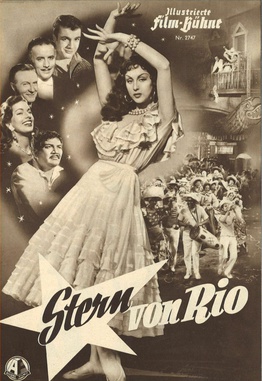
The Star of Rio is a 1955 West German-Italian adventure film directed by Kurt Neumann and starring Maria Frau, Johannes Heesters and Willy Fritsch. It is a remake of the 1940 film of the same title.
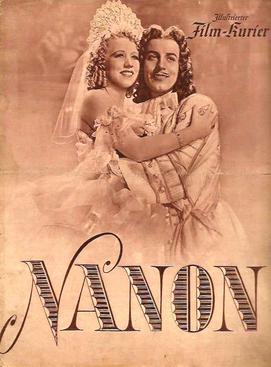
Nanon is a 1938 German historical film directed by Herbert Maisch and starring Erna Sack, Johannes Heesters and Dagny Servaes. It is based on the original operetta Nanon by Richard Genée which had a libretto by F Zell, although the music for this film was specially commissioned from Alois Melichar.
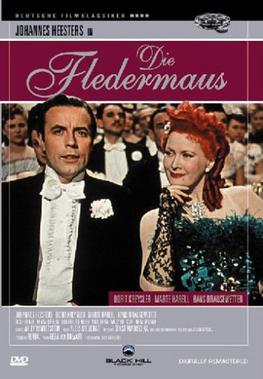
Die Fledermaus is a 1946 German operetta film directed by Géza von Bolváry and starring Marte Harell, Johannes Heesters, and Will Dohm. It is based on Johann Strauss II's 1874 work of the same name.

My Aunt, Your Aunt is a 1939 German comedy film directed by Carl Boese and starring Ralph Arthur Roberts, Johannes Heesters, and Olly Holzmann. It was shot at the Babelsberg Studios in Berlin. The film's sets were designed by the art director Ernst H. Albrecht. Boese later directed a 1956 film of the same title.
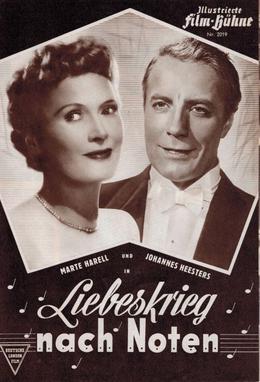
A Musical War of Love is a 1953 West German comedy film directed by Karl Hartl and starring Marte Harell, Johannes Heesters and Paul Kemp. It was shot at the Bavaria Studios in Munich. The film's sets were designed by the art director Hans Ledersteger and Ernst Richter.

Roses in Tyrol is a 1940 German musical comedy film directed by Géza von Bolváry and starring Hans Moser, Marte Harell, and Johannes Heesters. It is based on the 1891 operetta The Bird Seller by Carl Zeller, which has been turned into several films.
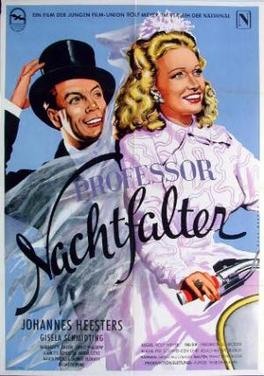
Professor Nachtfalter is a 1951 West German comedy film directed by Rolf Meyer and starring Johannes Heesters, Jeanette Schultze and Maria Litto. The film's sets were designed by the art director Franz Schroedter. The film was made at the Bendestorf Studios and partly shot on location at Lake Constance. The film's sets were designed by the art director Franz Schroedter. It cost around 900,000 Deutschmarks to make.
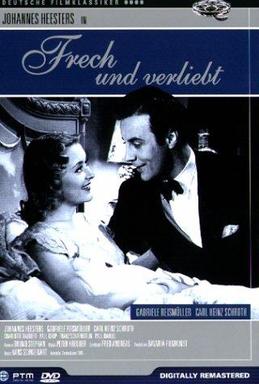
Insolent and in Love is a 1948 German romantic comedy film directed by Hans Schweikart and starring Johannes Heesters, Gabriele Reismüller and Charlott Daudert. It was shot at the Bavaria Studios in Munich. The film's sets were designed by the art director Hans Sohnle. The film was made in 1944 but it did not receive a national release until 1948. In 1950 it was distributed in Austria by Sascha Film.
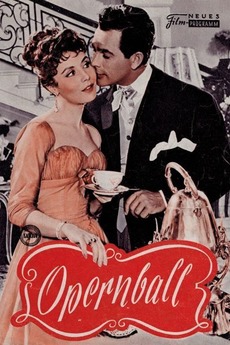
Opera Ball is a 1956 Austrian musical comedy film directed by Ernst Marischka and starring Johannes Heesters, Hertha Feiler and Josef Meinrad. Based on the 1898 operetta Der Opernball, it is part of the operetta film tradition. A previous film version had been made in 1939.
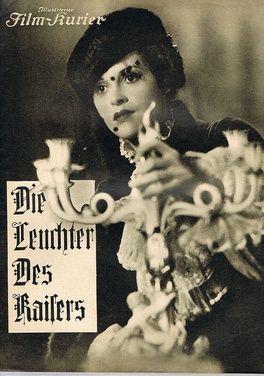
The Emperor's Candlesticks is a 1936 Austrian historical adventure film directed by Karl Hartl and starring Sybille Schmitz, Karl Ludwig Diehl and Friedl Czepa. It is an adaptation of Baroness Orczy's 1899 novel The Emperor's Candlesticks. A Hollywood film version of the story The Emperor's Candlesticks was released the following year.
Dorothea Anna Chlotilde Komarek was an Austrian dancer, actress and operatic soprano.

The Schimeck Family is a 1935 German comedy film directed by E.W. Emo and starring Hans Moser, Käthe Haack and Hilde Schneider. It was shot at Johannisthal Studios in Berlin. The film's sets were designed by the art directors Karl Böhm and Heinrich Richter. It is based on the play The Schimek Family by Gustaf Kadelburg, previously adapted into a 1926 silent film and later into a 1957 Austrian film.

And Who Is Kissing Me? is a 1956 Austrian comedy film directed by Max Nosseck and starring Hans Moser, Grethe Weiser, Theo Lingen and Johannes Heesters, who each play themselves. The film's sets were designed by the art director Felix Smetana. Location shooting took place in Vienna. It is not a remake of the 1933 German film And Who Is Kissing Me?. The film is also known by the alternative title Ein Herz und eine Seele.

















